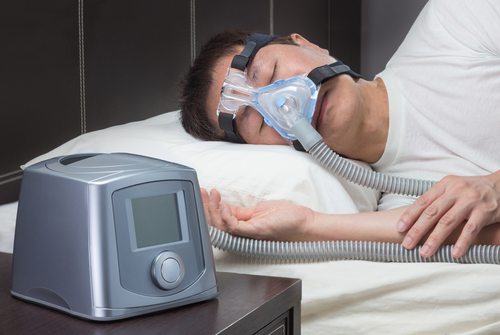Sleep Problems and Your Nose

Your nose can be the source of a wide variety of sleep-related problems. If you suffer from persistent congestion, chronic nosebleeds, excessive snoring and difficulty breathing, you may have a deviated septum.
At Daines Plastic Surgery, Dr. Daines specializes in rhinoplasty and septoplasty procedures. By committing himself to a more focused realm of plastic surgery, Dr. Daines ensures his patients receive the care and expertise they deserve to fix their internal and external nasal problems.
What Is a Deviated Septum?
The septum is a dividing wall of cartilage and bone that separates the nasal passages. A deviated septum refers to a septum that does not symmetrically divide the nasal passages, meaning one side is obstructed and does not allow as much air to pass through. A deviated septum is actually very common and few people have a perfectly straight septum; however, deviated septum that noticeably affects the ability to breathe is more uncommon.
A deviated septum can be the result of a traumatic injury to the nose but may also be a condition present since birth. A visibly crooked nose does not always signify the presence of a deviated septum, and a deviated septum may not always have outwardly-visible signs.
Constant Stuffiness and Difficulty Breathing
If you suffer from a deviated septum, you may have difficulty breathing out of one nostril or both nostrils. Irregular breathing can make it difficult for the body to fall into a natural and healthy breathing pattern, leading to disturbed sleep and other symptoms that develop as a result of chronic mouth breathing.
Your nose may also constantly feel stuffy due to obstruction of the nostrils. Severe obstruction can make it difficult to exercise due to a lack of oxygen and can also impact your ability to taste. Allergies and sickness may worsen this feeling of congestion.
Chronic Snoring
While snoring is very common and has many potential causes, mouth breathing and obstructed breathing resulting from a deviated septum can lead to this common issue. Chronic snoring can make sleeping difficult for both you and your partner, creating a source of stress that can leave multiple parties frustrated. Many products and methods to eliminate snoring exist but addressing the root cause of the issue always provides the most effective and long-lasting results.
Sleep Apnea
Sleep apnea is a disorder that occurs when breathing suddenly starts and stops during sleep. When breathing is severely obstructed, the body can suffer from a lack of oxygen while resting. This obstruction can result in a sudden gasping for air while sleeping and contribute toward poor rest. While a deviated septum is typically not the singular cause of sleep apnea, it can worsen the effects of the sleep disorder.
Correct Your Deviated Septum with Septoplasty
If you have trouble sleeping and experience any of the common symptoms and signs of a deviated septum, consider scheduling a septoplasty procedure to restore symmetry to your septum. A septoplasty is a surgical procedure that corrects septum deviation by reconstructing and correcting the shape of the septum.
Every septoplasty procedure is different due to each patient’s unique problems. Septoplasty can be performed as either an open or closed procedure. Closed procedures are completed using only interior incisions, while open procedures require an incision across the columella, the tissue bridging the space between the nostrils. Cartilage grafts may also be used during septoplasty and can be taken from the ears, the ribs or other parts of the septum.
If you are interested in a septoplasty procedure, Dr. Daines will sit down with you during a one-on-one consultation to discuss your needs and explain the steps he will take to correct your deviated septum.
Septoplasty Side Effects and Recovery
Common side effects from septoplasty include mild pain, stuffiness and nasal drainage. Bleeding is common during the first couple of days. Stuffiness typically improves after one week but may linger for a few weeks as swelling continues to subside. If you received an open septoplasty procedure, expect some visible swelling for a few weeks. Closed procedures typically do not yield any visible side effects. Final results will continue to improve over the course of a few months.
Once you heal from your septoplasty, you should enjoy an improved ability to breathe and may notice decreased snoring and better rest that will greatly benefit your quality of life. If you have any cosmetic issues you would like to address simultaneously, Dr. Daines can also perform rhinoplasty to correct a dorsal hump, bulbous tip, or other common imperfections. Let him know during your initial consultation and he will formulate an individualized treatment plan for you.
If you suffer from frequent congestion, sleeping problems, snoring and other unpleasant nasal symptoms, schedule an appointment at Daines Plastic Surgery right away to learn if septoplasty is the right procedure for you. Call us today at 949-397-6499 to schedule your consultation with Dr. Daines.



